-
ARTÍCULO DE REVISIÓN
Telenursing in the postoperative period: a scoping review
Revista Brasileira de Enfermagem. 2024;77(3):e20240066
29/07/2024
Resumo
ARTÍCULO DE REVISIÓNTelenursing in the postoperative period: a scoping review
Revista Brasileira de Enfermagem. 2024;77(3):e20240066
29/07/2024DOI 10.1590/0034-7167-2024-0066
Visualizações0Ver maisABSTRACT
Objectives:
to map available evidence on telenursing use in the postoperative period and its impact on patient outcomes.
Methods:
a scoping review, conducted according to the JBI model and the PRISMA-ScR checklist. The search was carried out in the CINAHL, Embase, LILACS, PubMed, Web of Science, SciELO, Scopus and Cochrane Library databases.
Results:
twelve studies were included, published between 2011 and 2023, 66.6% of which were in developed countries. Of the positive outcomes, we highlight improved levels of disability, autonomy and quality of life, lower rates of post-operative complications, pain and reduced costs. Telephone monitoring was the most widely used modality, but there were few studies in the pediatric context and in Brazil.
Conclusions:
of the studies, 11 (91.6%) identified at least one positive outcome in telenursing use and none showed negative aspects in the postoperative period. The role of nurses in digital health needs further study.

-
ARTÍCULO ORIGINAL
Sexual counseling for people with acute coronary syndrome: educational video development
Revista Brasileira de Enfermagem. 2024;77(3):e20230416
29/07/2024
Resumo
ARTÍCULO ORIGINALSexual counseling for people with acute coronary syndrome: educational video development
Revista Brasileira de Enfermagem. 2024;77(3):e20230416
29/07/2024DOI 10.1590/0034-7167-2023-0416
Visualizações0Ver maisABSTRACT
Objective:
to assess validity evidence of an educational video on safe sexual activity after acute coronary syndrome.
Method:
study in three phases: video development; content validity analysis by 11 experts; and analysis of validity based on response processes by seven people with coronary disease. The content validity ratio (CVR) was calculated with critical values for the second phase of 0.63 and for the third of 1.0.
Results:
the video addressed the importance of resuming sexual activity and positions that consume less energy, clinical warning signs, the importance of adhering to treatment and a welcoming environment for sexual practice. A CVR above the critical value was obtained with a total of 4 minutes and 41 seconds.
Conclusion:
the educational video brings together adequate content validity evidence and can be used as a tool for patients after acute coronary syndrome.
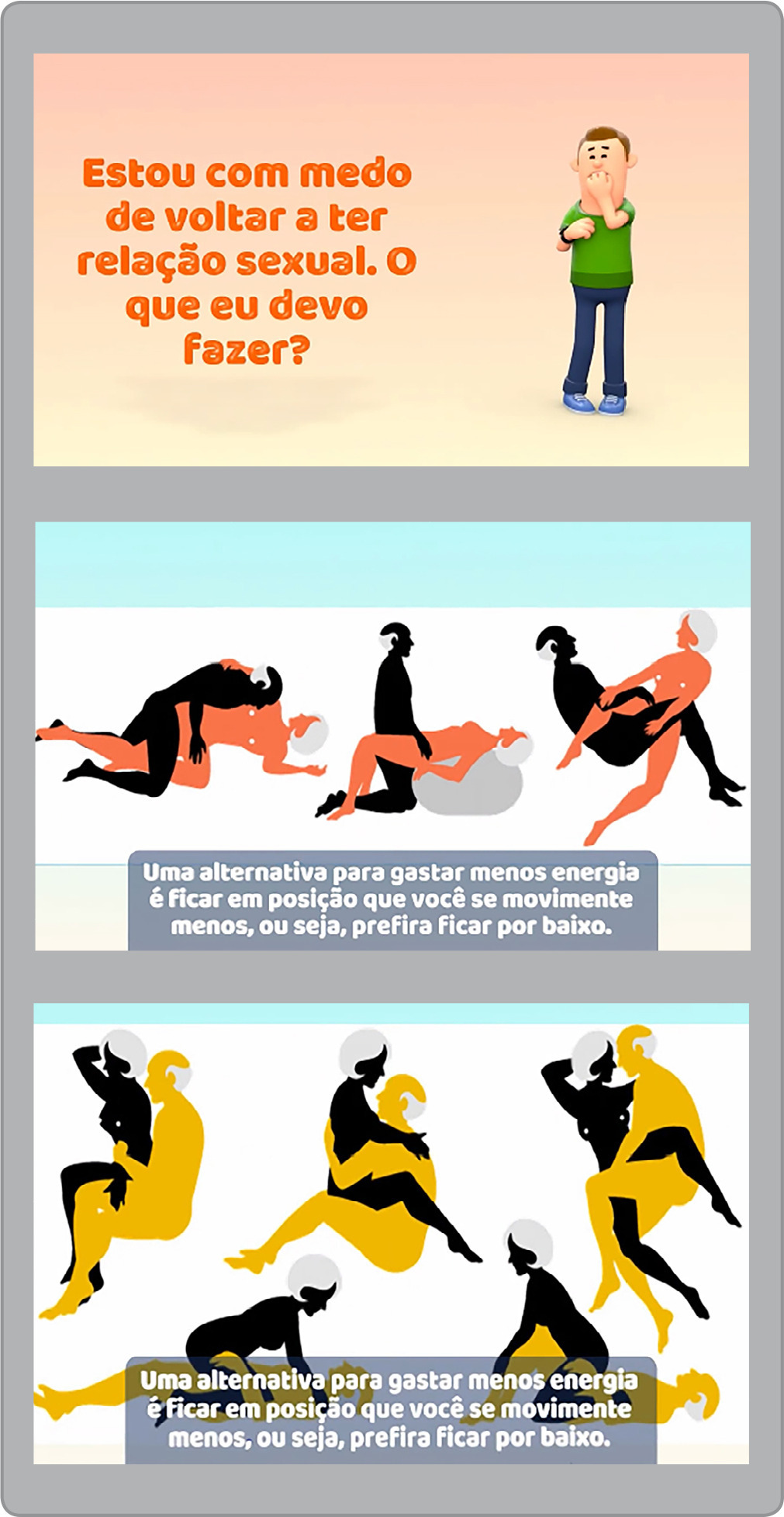
-
ARTÍCULO ORIGINAL
Evaluation of software technical quality for collecting data from patients under palliative care
Revista Brasileira de Enfermagem. 2024;77(3):e20230435
29/07/2024
Resumo
ARTÍCULO ORIGINALEvaluation of software technical quality for collecting data from patients under palliative care
Revista Brasileira de Enfermagem. 2024;77(3):e20230435
29/07/2024DOI 10.1590/0034-7167-2023-0435
Visualizações0ABSTRACT
Objectives:
to evaluate software technical quality for collecting data from patients under palliative care.
Methods:
this is methodological technology evaluation research, according to the technical standard International Organization for Standardization/International Electrotechnical Commission 25040-2011, developed from August 2021 to August 2023. Eight nurses and eight information technology professionals participated as judges, who evaluated six quality characteristics and 23 subcharacteristics. Items that reached a percentage of agreement greater than 70% were considered suitable.
Results:
the characteristics evaluated by nurses/information technology professionals received the following percentages of agreement, respectively: functional suitability (94%-84%); reliability (100-70%); usability (89.9-66.8%); performance efficiency (95.8%-86.1%); compatibility (95.8-79.6%); and safety (96%-83.4%).
Conclusions:
the software was considered suitable in quality evaluation to offer support to nurses in collecting patient data under palliative care, with the potential to operationalize the first Nursing Process stage.
Palavras-chave: BiomedicalData CollectionNursing ProcessPalliative CareSoftwareTechnology AssessmentVer mais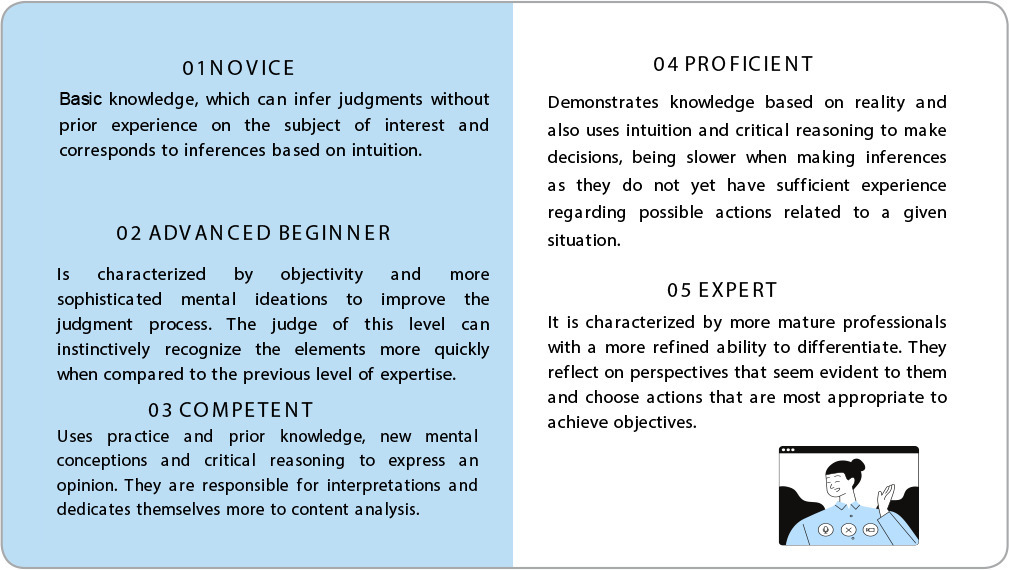
-
ARTÍCULO ORIGINAL
Mental health of parents of children and adolescents who require special health care
Revista Brasileira de Enfermagem. 2024;77(3):e20230457
29/07/2024
Resumo
ARTÍCULO ORIGINALMental health of parents of children and adolescents who require special health care
Revista Brasileira de Enfermagem. 2024;77(3):e20230457
29/07/2024DOI 10.1590/0034-7167-2023-0457
Visualizações0Ver maisABSTRACT
Objective:
To identify the manifestations presented by parents of children and adolescents who require special health attention that can impact their mental health.
Methods:
exploratory, qualitative research, based on the concept of vulnerability, with data collection carried out through interviews with 18 parents of children and adolescents with special health care needs, hospitalized in the pediatric ward of a hospital in Paraná, between May/2017 and May/ 2018. Data analyzed by inductive thematic analysis.
Results:
parents experienced situations of vulnerability when providing care at home, with repercussions on their mental health, expressed by manifestations of lack of protection, anxiety and depression.
Final considerations:
It is important that health professionals seek to expand actions to promote care and reduce situations that generate threats, insecurities, concerns and damage to the health of parents, which can impact and further weaken care for children and adolescents who need attention especially health.
-
ARTÍCULO ORIGINAL
Disrupted mother-fetus dyad risk in high-risk pregnancies: a Middle-Range Theory
Revista Brasileira de Enfermagem. 2024;77(3):e20230464
29/07/2024
Resumo
ARTÍCULO ORIGINALDisrupted mother-fetus dyad risk in high-risk pregnancies: a Middle-Range Theory
Revista Brasileira de Enfermagem. 2024;77(3):e20230464
29/07/2024DOI 10.1590/0034-7167-2023-0464
Visualizações0ABSTRACT
Objectives:
to develop and evaluate a Middle-Range Theory for the nursing diagnosis “Disrupted Mother-Fetus Dyad Risk” in high-risk pregnancies.
Methods:
this methodological study was conducted in two stages: theory development and evaluation. Dorothea Orem’s General Nursing Model was used as the theoretical-conceptual foundation. Evaluation was conducted using the Delphi method with seven judges, and consensus was achieved when the Content Validity Index of the evaluated items was ≥ 0.80.
Results:
the theory identified 20 elements of the nursing diagnosis “Disrupted Mother-Fetus Dyad Risk” (10 risk factors, 4 at-risk populations, and 6 associated conditions), 14 propositions, and 1 pictogram. After two rounds of evaluation, the theory was considered consistent, with consensus reached for all items, each achieving a Content Validity Index ≥ 0.80.
Conclusions:
the Middle-Range Theory included biopsychosocial factors explaining the nursing phenomenon “Disrupted Mother-Fetus Dyad Risk,” which aids in nurses’ diagnostic reasoning.
Palavras-chave: High-RiskMaternal-Fetal RelationsNursing DiagnosisNursing ProcessNursing TheoryPregnancyVer mais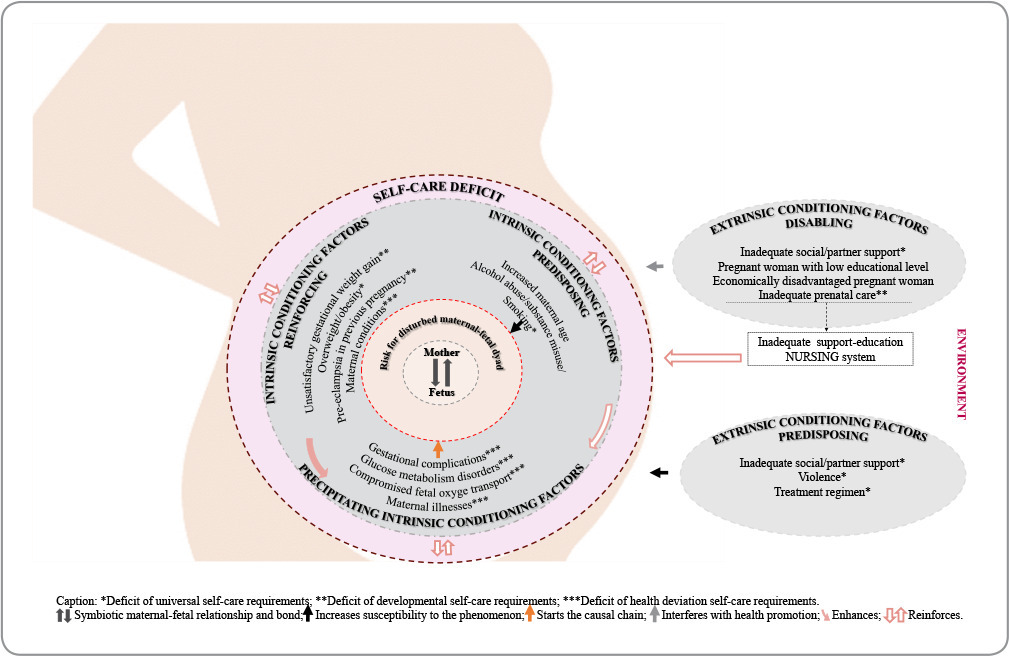
-
ARTÍCULO ORIGINAL
Completeness of variables in Hospital-Based Cancer Registries for prostatic malignant neoplasm
Revista Brasileira de Enfermagem. 2024;77(3):e20230467
29/07/2024
Resumo
ARTÍCULO ORIGINALCompleteness of variables in Hospital-Based Cancer Registries for prostatic malignant neoplasm
Revista Brasileira de Enfermagem. 2024;77(3):e20230467
29/07/2024DOI 10.1590/0034-7167-2023-0467
Visualizações0ABSTRACT
Objectives:
to analyze the completeness of variables from Hospital-Based Cancer Registries of cases of prostate neoplasm in the Oncology Care Network of a Brazilian state between 2000 and 2020.
Methods:
an ecological time series study, based on secondary data on prostate cancer Hospital-Based Cancer Registries prostate. Data incompleteness was classified as excellent (<5%), good (between 5%-10%), fair (10%-20%), poor (20%-50%) and very poor (>50%), according to the percentage of lack of information.
Results:
there were 13,519 cases of prostate cancer in the Hospital-Based Cancer Registries analyzed. The variables “family history of cancer” (p<0.001), “alcoholism” (p<0.001), “smoking” (p<0.001), “TNM staging” (p<0.001) had a decreasing trend, while “clinical start of treatment” (p<0.001), “origin” (p=0.008) and “occupation” (p<0.001) indicated an increasing trend.
Conclusions:
most Hospital-Based Cancer Registries variables showed excellent completeness, but important variables had high percentages of incompleteness, such as TNM and clinical staging, in addition to alcoholism and smoking.
Palavras-chave: EpidemiologyHospital RecordsMedical OncologyProstatic NeoplasmsPublic Health SurveillanceVer mais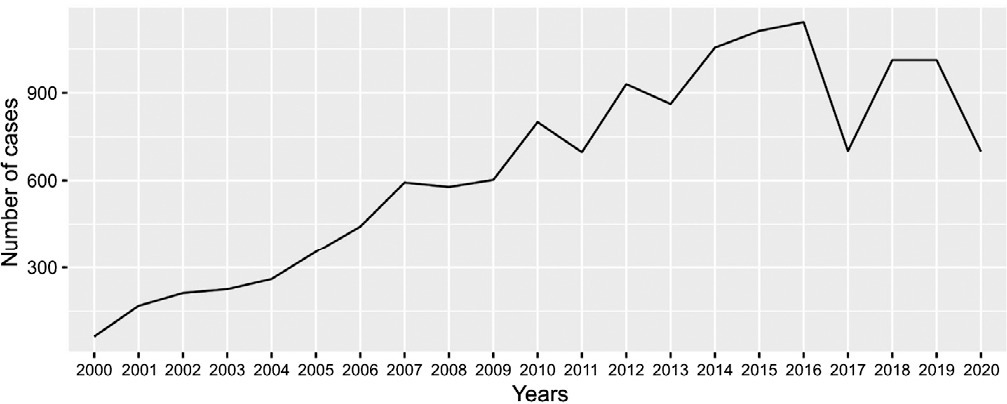
-
ARTÍCULO ORIGINAL
Contribution of informal caregivers to self-care in individuals with heart failure
Revista Brasileira de Enfermagem. 2024;77(3):e20230492
29/07/2024
Resumo
ARTÍCULO ORIGINALContribution of informal caregivers to self-care in individuals with heart failure
Revista Brasileira de Enfermagem. 2024;77(3):e20230492
29/07/2024DOI 10.1590/0034-7167-2023-0492
Visualizações0Ver maisABSTRACT
Objectives:
to evaluate the contribution of informal caregivers to the self-care of individuals with heart failure.
Methods:
a cross-sectional study was conducted with 87 caregivers from March to October 2022 in the city of João Pessoa/PB. The caregivers’ contribution was assessed using the Caregiver Contribution to Self-Care of Heart Failure Index instrument. Scores ≥ 70 points indicate adequate contribution. Data were analyzed using descriptive statistics and Spearman’s correlation.
Results:
the sample consisted of 81.6% female caregivers. Median scores obtained for the self-care contribution scales were: 63.3 for maintenance; 55.5 for management; and 66.6 for confidence. Caregivers never or rarely recommended monitoring body weight, regular physical exercise, extra use of diuretics, and fluid restriction.
Conclusions:
informal caregivers showed inadequate contribution in the areas of maintenance, management, and confidence in self-care of individuals with heart failure.
-
ARTÍCULO DE REVISIÓN
Profile of scientific production on nursing technology construction, validity and application: a bibliometric study
Revista Brasileira de Enfermagem. 2024;77(3):e20230452
29/07/2024
Resumo
ARTÍCULO DE REVISIÓNProfile of scientific production on nursing technology construction, validity and application: a bibliometric study
Revista Brasileira de Enfermagem. 2024;77(3):e20230452
29/07/2024DOI 10.1590/0034-7167-2023-0452
Visualizações0ABSTRACT
Objective:
to analyze the profile of scientific production on nursing technology construction, validity and application.
Methods:
this is a bibliometric study, carried out in six databases, based on the Methodi Ordinatio application, arranged in nine stages. To represent the findings, the VOSviewer® software was used.
Results:
346 studies were identified, obtained from BDENF, CINAHL, EMBASE, LILACS, PubMed/MEDLINE, Scopus and Web of Science. There was a predominance of the English language, and 20% of the authors hold more than 25% of studies. Only two journals account for 25% of studies in the period studied. Twenty-six studies were selected for the InOrdinatio classification. Nursing Process (23%) stood out among the studies. The most produced technology was software (27%), and 50% of works describe construction and validity.
Conclusions:
there is an emphasis on the creation of educational technologies, especially information technology. The data demonstrates opportunities for future research in the area.
Palavras-chave: Bibliometric AnalysesEducational TechnologyNursingNursing Methodology ResearchTechnologyVer mais
-
ARTÍCULO ORIGINAL
Uso de tecnologia móvel para o cuidado gestacional: avaliação do aplicativo GestAção
Revista Brasileira de Enfermagem. 2019;72:266-273
13/12/2019
Resumo
ARTÍCULO ORIGINALUso de tecnologia móvel para o cuidado gestacional: avaliação do aplicativo GestAção
Revista Brasileira de Enfermagem. 2019;72:266-273
13/12/2019DOI 10.1590/0034-7167-2018-0641
Visualizações0RESUMO
Objetivo:
avaliar o aplicativo GestAção, com base na experiência de uso das gestantes.
Método:
estudo de natureza avaliativa, aplicada, metodológica, com abordagem quanti-qualitativa. A ferramenta tecnológica foi avaliada por 13 gestantes por meio de questionários para a caracterização do perfil sociodemográfico e o uso da escala de Likert, para calcular o Índice de Validade de Conteúdo (IVC) do aplicativo; e entrevista semiestruturada, com análise fundamentada na Semiótica.
Resultados:
o estudo evidenciou significativo nível de satisfação das gestantes com o uso do aplicativo, considerando os objetivos (IVC= 0,92), estrutura e apresentação (IVC= 0,86), e relevância (IVC= 0,92).
Considerações finais:
o aplicativo GestAção obteve IVC geral de 0,90, evidenciando-o como tecnologia facilitadora e coadjuvante no empoderamento das gestantes interessadas em obter conhecimentos sobre o período gravídico, mostrando-se uma potente ferramenta para qualificar as boas práticas na consulta de enfermagem.
Palavras-chave: Aplicativos MóveisCuidados de EnfermagemGestaçãoPromoção da SaúdeTecnologia em SaúdeVer mais -
ARTÍCULO DE REVISIÓN
Polycyclic aromatic hydrocarbons and development of respiratory and cardiovascular diseases in workers
Revista Brasileira de Enfermagem. 2020;73(3):e20180965
22/04/2020
Resumo
ARTÍCULO DE REVISIÓNPolycyclic aromatic hydrocarbons and development of respiratory and cardiovascular diseases in workers
Revista Brasileira de Enfermagem. 2020;73(3):e20180965
22/04/2020DOI 10.1590/0034-7167-2018-0965
Visualizações0ABSTRACT
Objectives:
to identify the scientific evidence on the development of cardiovascular and respiratory diseases due to workplace contamination by polycyclic aromatic hydrocarbons.
Methods:
integrative literature review. The search for primary articles was held in October 2017 in the Medical Literature Analysis and Retrieval System Online (through Pubmed), Web of Science and Latin American and Caribbean Literature in Health Sciences (LILACS).
Results:
the 16 studies analyzed showed that exposure to polycyclic aromatic hydrocarbons was associated with cardiovascular diseases, such as increased blood pressure, heart rate variation, and ischemic heart disease; and respiratory disorders, such as decreased lung function, chronic obstructive pulmonary disease, asthma, wheeze, coughing, pulmonary wheezing, chest tightness, effort dyspnea, and sore throat.
Conclusions:
polycyclic aromatic hydrocarbons cause deleterious effects on the cardiovascular and respiratory systems through mutations and cellular inflammation, being a risk to exposed individuals.
Palavras-chave: Cardiovascular DiseasesPolycyclic Aromatic HydrocarbonsRespiratory DiseasesVolatile Organic CompoundsWorkersVer mais
-
REFLEXIÓN
Trabalho do enfermeiro no contexto da pandemia de COVID-19
Revista Brasileira de Enfermagem. 2021;74:e20200594
05/03/2021
Resumo
REFLEXIÓNTrabalho do enfermeiro no contexto da pandemia de COVID-19
Revista Brasileira de Enfermagem. 2021;74:e20200594
05/03/2021DOI 10.1590/0034-7167-2020-0594
Visualizações0Ver maisRESUMO
Objetivo:
Refletir sobre o trabalho experienciado pelo enfermeiro no enfrentamento da pandemia de COVID-19 vivenciado em um hospital público do estado do Rio Grande do Norte.
Métodos:
Ensaio reflexivo embasado na vivência profissional em um hospital público de referência para atendimento de pacientes acometidos pela COVID-19 no estado do Rio Grande do Norte. Os resultados foram organizados em duas categorias empíricas, que destacam as potencialidades e entraves do trabalho do enfermeiro diante da COVID-19, apresentados por meio do diagrama de Ishikawa.
Resultados:
Duas categorias emergiram das experiências vivenciadas: Protagonismo da enfermagem na organização dos serviços de saúde para o enfrentamento da COVID-19; e O exercício da gerência dos cuidados de enfermagem na pandemia de COVID-19.
Considerações finais:
Necessita-se valorizar o trabalho do enfermeiro em todos os seus atributos, bem como fortalecer os processos de trabalho interdisciplinares, que colaboram para a superação da crise ocasionada pela pandemia.
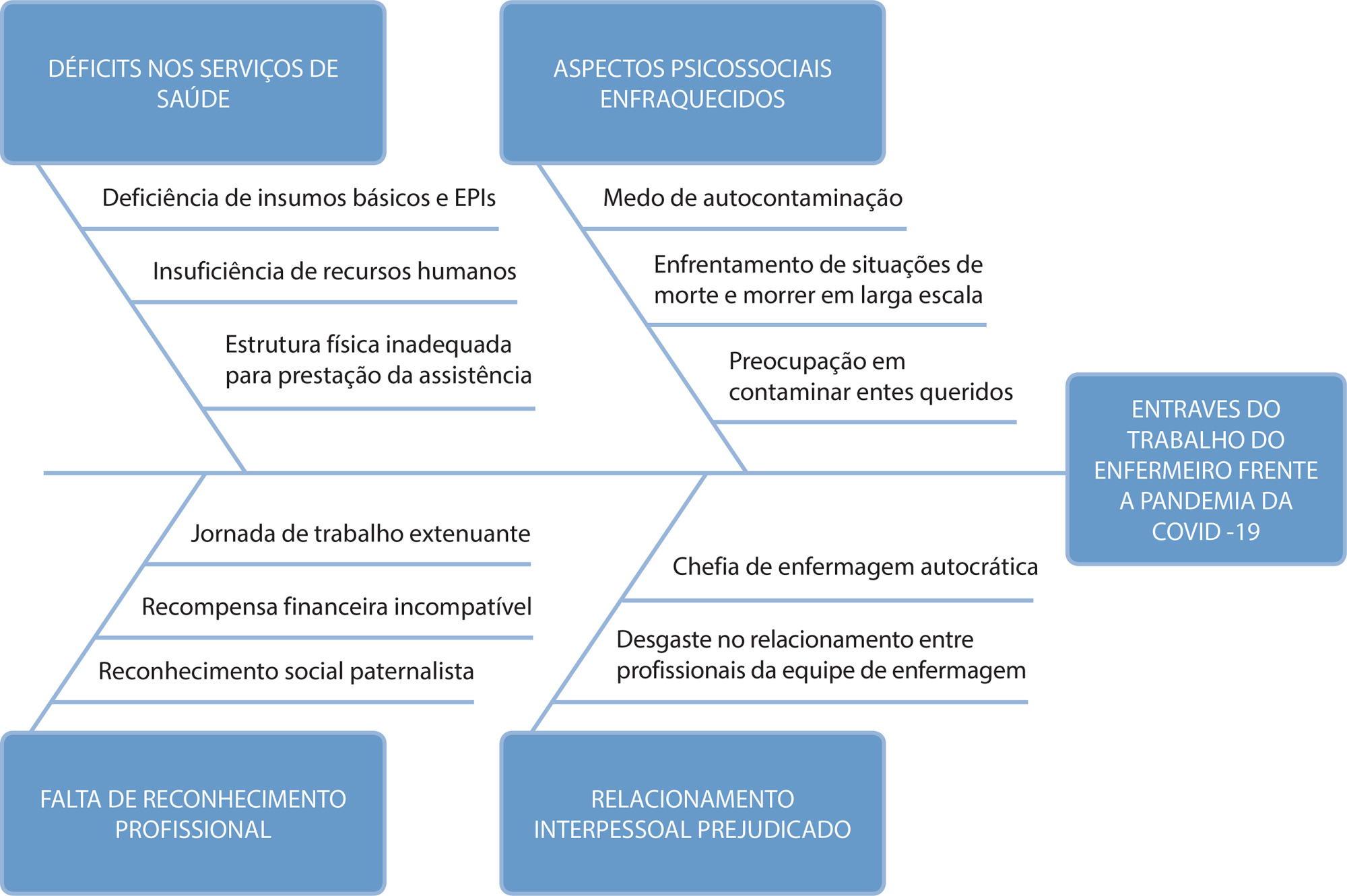
-
REFLEXIÓN
Como traduzir o conhecimento científico à prática? Conceitos, modelos e aplicação
Revista Brasileira de Enfermagem. 2020;73(5):e20190179
01/07/2020
Resumo
REFLEXIÓNComo traduzir o conhecimento científico à prática? Conceitos, modelos e aplicação
Revista Brasileira de Enfermagem. 2020;73(5):e20190179
01/07/2020DOI 10.1590/0034-7167-2019-0179
Visualizações0RESUMO
Objetivos:
apresentar o conceito de Tradução e Intercâmbio do Conhecimento tal como vem sendo utilizado na literatura internacional e, em particular, no Canadá. A seguir, descrever um renomado modelo conceitual para orientar a sua implementação, intitulado Ciclo do Conhecimento à Ação.
Resultados:
ilustramos a utilização do modelo no contexto do sistema municipal de atenção básica à saúde no sul do Brasil, na implementação de estratégias de manejo da dor durante a vacinação.
Conclusões:
nesta reflexão teórica, argumentamos sobre a importância de se traduzir o conhecimento científico aos diversos contextos de prática e criar oportunidades de intercâmbio com os usuários desse saber, como profissionais de saúde, gestores, formuladores de políticas públicas, pacientes, familiares e demais grupos de interesse, para promover equidade e qualidade dos cuidados no Sistema Único de Saúde.
Palavras-chave: Competência ClínicaDifusãoDisseminação de InformaçãoTradução do ConhecimentoTranslaçãoVer mais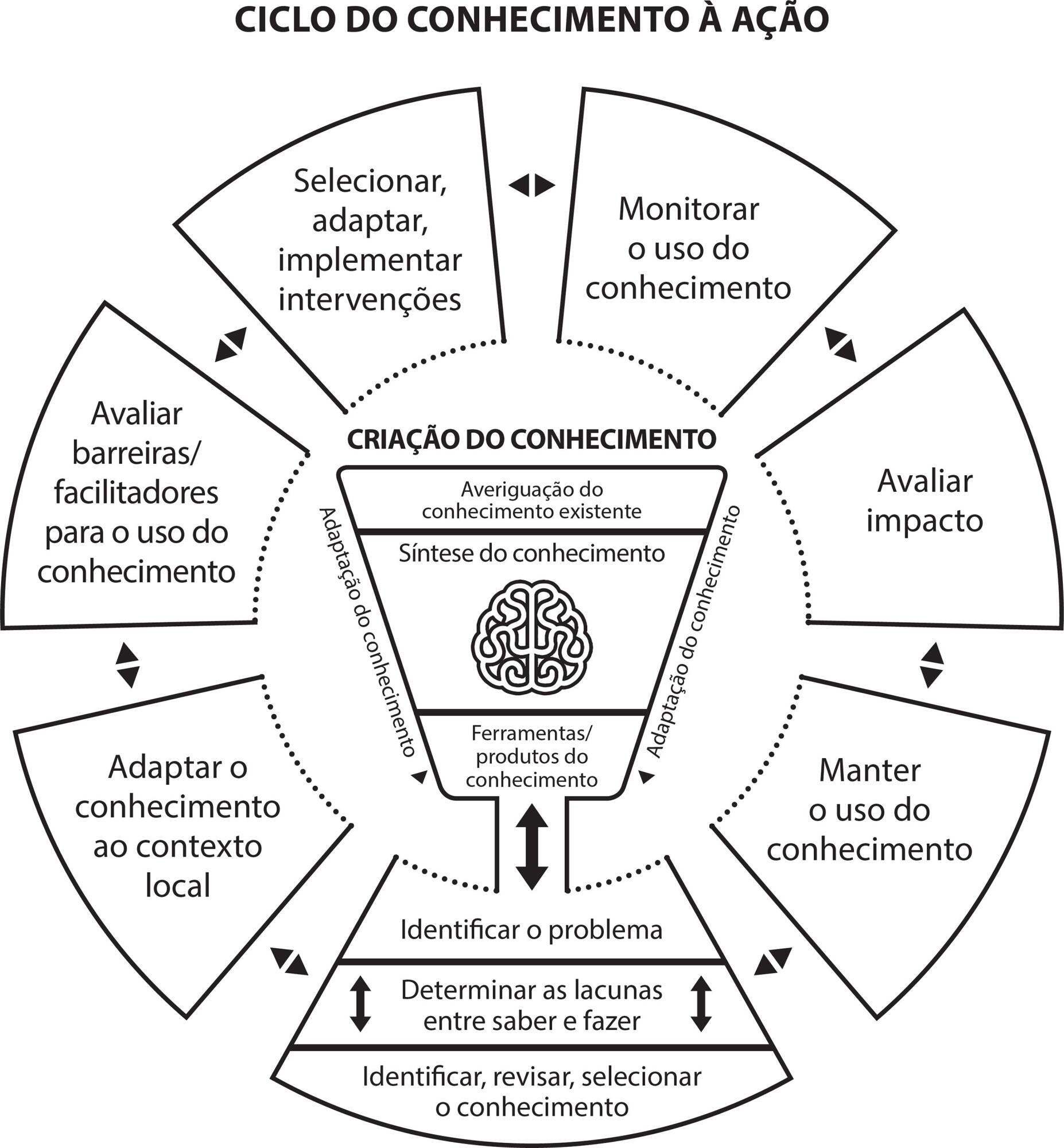
-
ARTÍCULO ORIGINAL
Construção e validação de protocolo assistencial de enfermagem com intervenções educativas para cuidadores familiares de idosos após Acidente Vascular Cerebral
Revista Brasileira de Enfermagem. 2020;73:e20180894
08/07/2020
Resumo
ARTÍCULO ORIGINALConstrução e validação de protocolo assistencial de enfermagem com intervenções educativas para cuidadores familiares de idosos após Acidente Vascular Cerebral
Revista Brasileira de Enfermagem. 2020;73:e20180894
08/07/2020DOI 10.1590/0034-7167-2018-0894
Visualizações0Ver maisRESUMO
Objetivo:
construir e validar o conteúdo de um protocolo assistencial de enfermagem com intervenções educativas para cuidadores familiares de idosos após Acidente Vascular Cerebral.
Métodos:
estudo metodológico conduzido em três etapas: (1) construção do protocolo por meio de revisão da literatura; (2) pré-teste com equipe multiprofissional, analisado com articulação da literatura; (3) validação do protocolo pela Técnica Delphi.
Resultados:
o protocolo foi estruturado nos domínios: Orientações Sobre a Doença; Suporte Emocional; Utilização da Rede de Atenção à Saúde; Alimentação; Vias Aéreas; Medicações; Higiene; Cuidados com a Pele; Eliminações; Vestir/Despir; Posicionamento e Transferência; Prevenção de Quedas. No pré-teste, oito especialistas avaliaram a clareza e o conteúdo do protocolo. Na validação, houveram duas rodadas pela Técnica Delphi. O protocolo validado foi composto por 12 domínios contendo 42 itens e 240 orientações de cuidados.
Conclusão:
o protocolo qualifica a transição do cuidado após alta hospitalar auxiliando os enfermeiros na prática assistencial no domicílio.
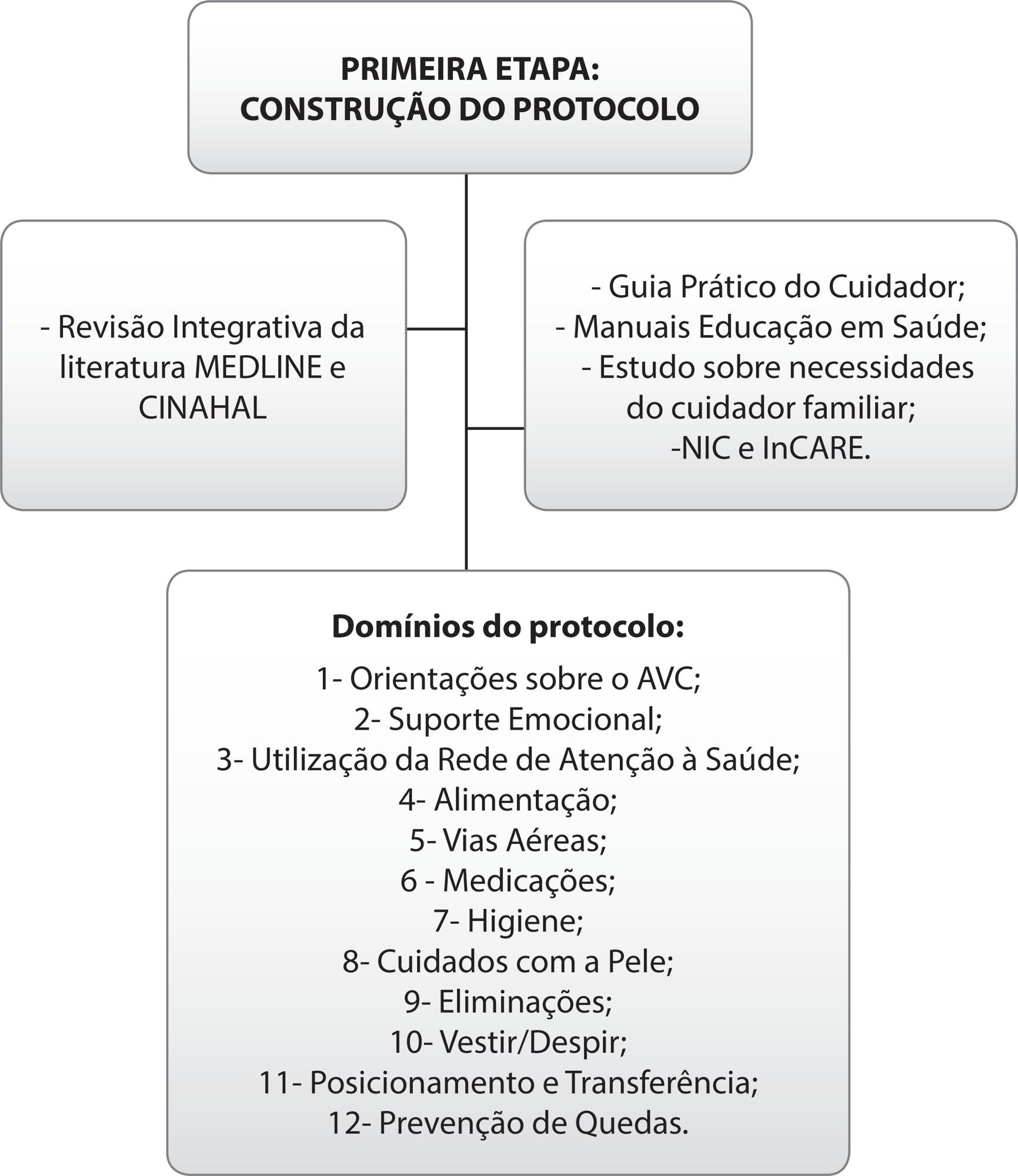
-
ARTÍCULO ORIGINAL
Construction and validation of an educational technology for mother-child bond in the neonatal intensive care unit
Revista Brasileira de Enfermagem. 2020;73(4):e20190083
01/06/2020
Resumo
ARTÍCULO ORIGINALConstruction and validation of an educational technology for mother-child bond in the neonatal intensive care unit
Revista Brasileira de Enfermagem. 2020;73(4):e20190083
01/06/2020DOI 10.1590/0034-7167-2019-0083
Visualizações0ABSTRACT
Objectives:
to describe the process of construction and validation of an educational booklet to promote bonding between mothers and newborns in a Neonatal Intensive Care Unit.
Methods:
methodological study developed through data collection in the literature and with the target audience; construction of the booklet; qualification of the material through validation by judges (health and communication experts/designer) and assessment by the target audience (mothers of at-risk newborns). Data were analyzed descriptively.
Results:
booklet content was validated, obtaining an overall Content Validity Index of 0.92. Appearance was rated “Superior” with 80% percentage. Mothers performed an assessment with 100% agreement between the items.
Conclusions:
the booklet was validated in all domains assessed and can be used by mothers with children hospitalized in the Neonatal Unit.
Palavras-chave: Educational TechnologyIntensive Care Units, NeonatalMother-Child RelationsNursingValidation StudiesVer mais
-
ARTÍCULO ORIGINAL
Perfil dos estudantes que cursam enfermagem: qualidade de vida, sono e hábitos alimentares
Revista Brasileira de Enfermagem. 2020;73:e20190365
10/07/2020
Resumo
ARTÍCULO ORIGINALPerfil dos estudantes que cursam enfermagem: qualidade de vida, sono e hábitos alimentares
Revista Brasileira de Enfermagem. 2020;73:e20190365
10/07/2020DOI 10.1590/0034-7167-2019-0365
Visualizações0RESUMO
Objetivo:
traçar o perfil e analisar a qualidade do sono, qualidade de vida e hábitos alimentares dos estudantes de enfermagem.
Métodos:
estudo transversal, comparativo e correlacional com as seguintes variáveis: características sociodemográficas, índice de qualidade de sono de Pittsburgh, qualidade de vida e hábitos alimentar. 195 estudantes participaram do estudo.
Resultados:
os participantes tinham em média 24 anos. Os resultados demonstraram que o sexo feminino foi prevalente (87,1%); 71,0% dos estudantes apresentaram qualidade de sono ruim; 98,9% faziam uso de aparelhos eletrônicos antes de dormir. A autopercepção da qualidade de vida foi indiferente (38,3%) e quanto à autopercepção de saúde geral, 36,9% expressaram-se satisfeitos. Dentre os participantes, 45,13% consumiam uma porção de fruta e 40,66% duas a três porções de verduras e legumes, diariamente.
Conclusão:
o estudo permitiu traçar o perfil desses estudantes, jovens que estudavam e trabalhavam, sedentários, acima do peso e com qualidade de sono ruim.
Palavras-chave: Comportamento AlimentarEstudantes de EnfermagemInquéritos e QuestionáriosQualidade de VidaSonoVer mais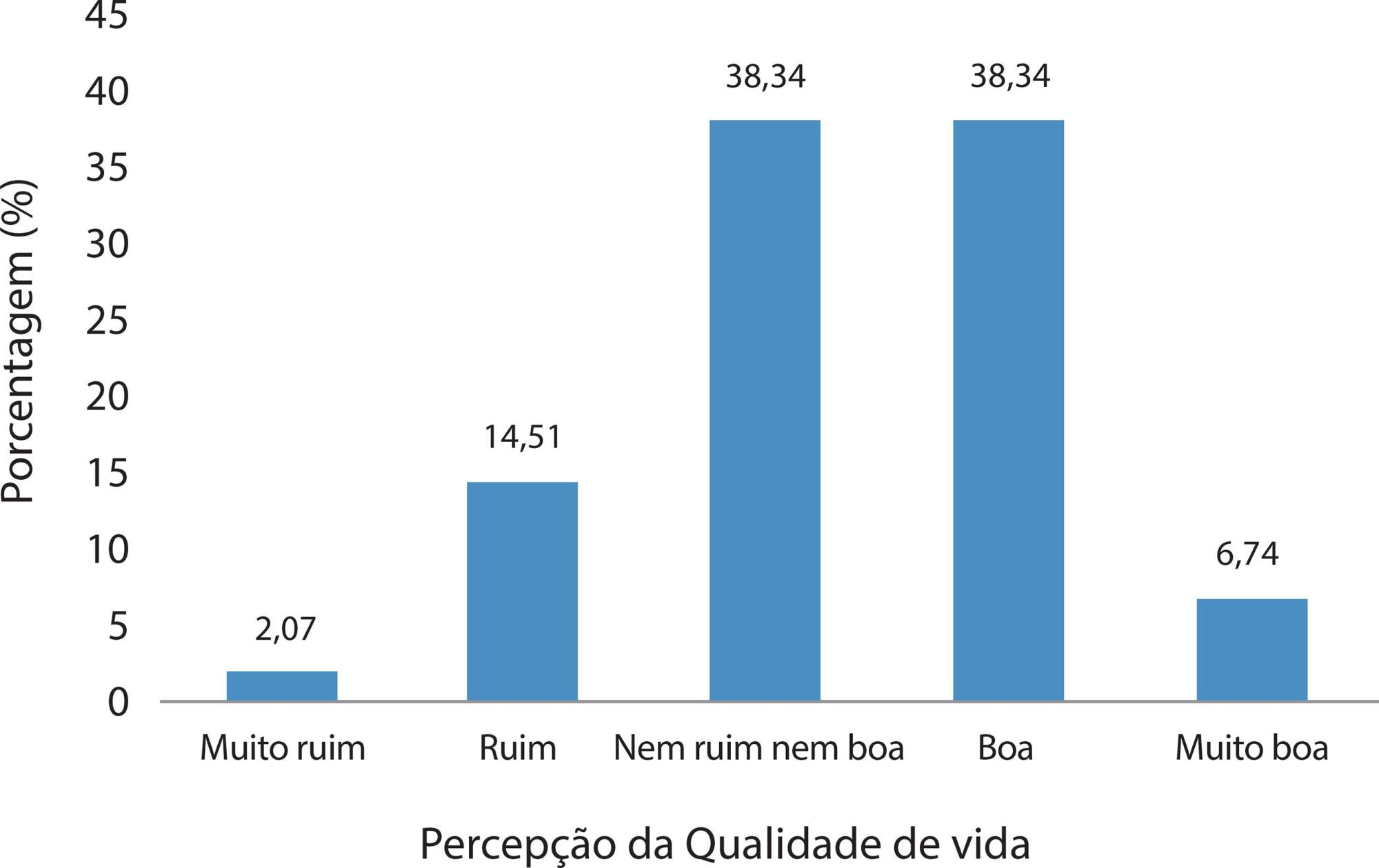
Búsqueda
Buscar en:
Nuvem de Tags
Adolescente (85) Atenção Primária à Saúde (239) COVID-19 (91) Criança (91) Cuidados de Enfermagem (269) Educação em Enfermagem (151) Educação em Saúde (139) Enfermagem (930) Enfermagem Pediátrica (86) Estudantes de Enfermagem (77) Estudos de Validação (131) Família (87) Idoso (208) Promoção da Saúde (99) Qualidade de Vida (104) Saúde do Trabalhador (86) Saúde Mental (145) Saúde Pública (82) Segurança do Paciente (150) Tecnologia Educacional (100)



